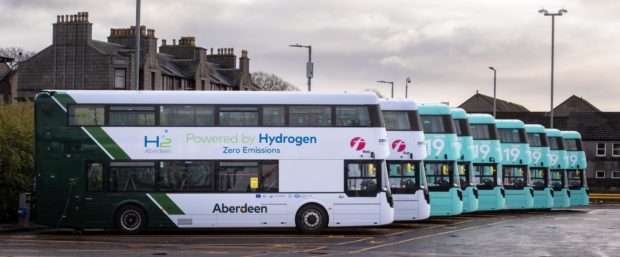Aberdeen’s fleet of hydrogen-powered double-decker buses has been pulled from service – just a year after they launched.
During routine checks on Thursday afternoon, an engineer found an issue with the mounting bracket at the rear of a Hydroliner.
The hydrogen-powered fleet has been pulled from service so the part can be upgraded and replaced on every bus.
Low emission buses from Glasgow will be running instead to minimise disruption while the technical issue is being investigated.
A spokeswoman from First Bus said: “To minimise the impact of this temporary vehicle withdrawal, we have reallocated low emission Euro VI buses from our Glasgow fleet and consequently we don’t anticipate any problems for customers planning a journey on our services.”
Wright Bus, who build the hydrogen-powered double-deckers, explain it is a “mechanical problem” not a hydrogen-fuel issue.
A spokeswoman for Wright Bus said: “After undertaking a thorough maintenance check, we have decided to upgrade and replace the part across the fleet to ensure we don’t see a repeat of the issue.
“We expect most of the buses to be back in service over the coming days.”
She stressed their buses have an “enviable safety record”.
The fleet mainly serves the number 19 route, connecting Peterculter to Tillydrone.
Wright Bus has apologised to customers for any inconvenience caused while the work is undertaken.
The hydroliners were the first of their kind in the world and have saved more than 1,500 tonnes of C02.
It is thought each vehicle saves around 80 tonnes of CO2 emissions each year as the exhausts only emit water. Aberdeen also makes its own hydrogen to fuel the buses using electricity made from wind power.
Each 60-seater vehicle cost around £500,000, as part of a £8.3 million city council project funded also by the European Union and Scottish Government.
